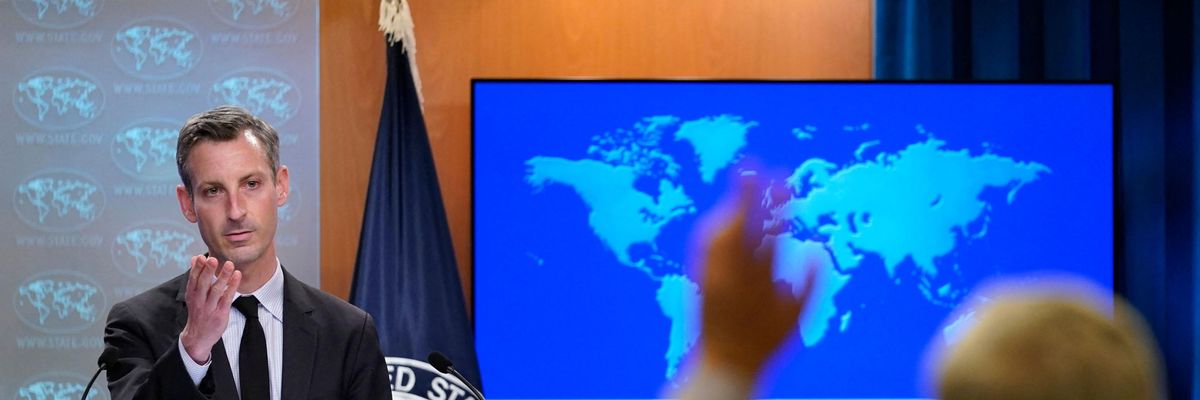
State Department spokesman Ned Price speaks during a briefing at the State Department in Washington, D.C. on February 1, 2022. (Photo: Susan Walsh/POOL/AFP via Getty Images)
AP Reporter Presses State Dept on Amnesty's Israel Report
"Why is it that all criticism of Israel from these groups is almost always rejected by the United States and yet accepted, welcomed, and endorsed when the criticism is of other countries?" asked Matt Lee.
Associated Press reporter Matt Lee called on the Biden administration to explain its rejection of Amnesty International's new report on Israel, which explicitly said this week that the country's U.S.-backed policies in Palestine amount to "apartheid."
After State Department spokesperson Ned Price told reporters Tuesday, "I reject the view that Israel's actions constitute apartheid" and noted that the department has "never used such terminology," Lee asked about the administration's inconsistent reception of Amnesty International's exhaustive research into human rights violations around the world.
"The [State Department's] last human rights report cited Amnesty International on Ethiopia and Cuba and China...on Burma, on Syria....and those references are endorsements of this group, Amnesty, and other groups as well," Lee said, referring to the department's annual Country Reports on Human Rights Practices.
"Why is it that all criticism of Israel from these groups is almost always rejected by the United States and yet accepted, welcomed, and endorsed when the criticism is of other countries, notably countries with which you have significant policy differences?" he asked.
\u201cIn an interesting exchange, @APDiploWriter pushes @StateDeptSpox on why the US is so critical of @Amnesty reports about Israel when it relies heavily on the group's findings that uncover human rights abuses elsewhere around the world.\u201d— Jacob Magid (@Jacob Magid) 1643759186
The State Department cited Amnesty International's reporting on Cuba as recently as 2019, quoting the group on political prisoners. In the department's report on human rights in China in 2017, Amnesty was cited regarding prison conditions in the country.
The group was also cited extensively in the State Department's 2020 report on the Xinjiang Uyghur Autonomous Region (XUAR) in China.
"You can't savage Amnesty International's and Human Rights Watch's work on Israel-Palestine without undermining their work everywhere else."
"It says in the report, 'Amnesty International found 'x' with Xinjiang and the Uyghurs and we determine that we think it's a genocide,' and you guys come out and cite that and say, 'We also agree that it's a genocide,'" said Lee, who then asked Price when the State Department has disagreed with the group's human rights findings on countries such as Iran, China, and Syria.
Price dismissed Lee's remarks, saying the State Department has a "vehement disagreement" with Amnesty's report on Israel and Palestine, which detailed Israel's "segregation and control of Palestinians" through restrictions on movement and other policies; the unlawful killing of Palestinians; the deprivation of Palestinians' economic and social rights through illegal blockades, military offensives, and unequal allocation of resources; the unlawful killing of Palestinians; and other violations.
Along with Price, U.S. Ambassador to Israel Tom Nides denounced the report as "absurd," while Senate Foreign Relations Committee chairman Sen. Bob Menendez (D-N.J.) said he was "deeply disturbed" by Amnesty's conclusions and accused the group of making "outrageous" accusations. Other human rights organizations including Human Rights Watch have similarly assessed Israel's policies toward Palestinians as amounting to genocide.
Jewish Currents editor-at-large Peter Beinart applauded Lee's line of questioning.
"So important to recognize that the U.S. and American Jewish establishment can't have it both ways," he tweeted. "You can't savage Amnesty International's and Human Rights Watch's work on Israel-Palestine without undermining their work everywhere else."
On Thursday, human rights groups in Israel condemned attacks on Amnesty's work in Israel and Palestine and accusations that the group's report was antisemitic.
"We wholeheartedly reject the idea that Amnesty International's report is baseless, singles out Israel, or displays antisemitic animus," wrote the groups, including Breaking the Silence, Physicians for Human Rights Israel, and B'Tselem.
"Attempts to distract from Israeli violations and to avoid substantive debate by hurling spurious accusations is the standard and ongoing practice of successive Israeli governments and their echo chambers overseas," they added.
An Urgent Message From Our Co-Founder
Dear Common Dreams reader, The U.S. is on a fast track to authoritarianism like nothing I've ever seen. Meanwhile, corporate news outlets are utterly capitulating to Trump, twisting their coverage to avoid drawing his ire while lining up to stuff cash in his pockets. That's why I believe that Common Dreams is doing the best and most consequential reporting that we've ever done. Our small but mighty team is a progressive reporting powerhouse, covering the news every day that the corporate media never will. Our mission has always been simple: To inform. To inspire. And to ignite change for the common good. Now here's the key piece that I want all our readers to understand: None of this would be possible without your financial support. That's not just some fundraising cliche. It's the absolute and literal truth. We don't accept corporate advertising and never will. We don't have a paywall because we don't think people should be blocked from critical news based on their ability to pay. Everything we do is funded by the donations of readers like you. Will you donate now to help power the nonprofit, independent reporting of Common Dreams? Thank you for being a vital member of our community. Together, we can keep independent journalism alive when it’s needed most. - Craig Brown, Co-founder |
Associated Press reporter Matt Lee called on the Biden administration to explain its rejection of Amnesty International's new report on Israel, which explicitly said this week that the country's U.S.-backed policies in Palestine amount to "apartheid."
After State Department spokesperson Ned Price told reporters Tuesday, "I reject the view that Israel's actions constitute apartheid" and noted that the department has "never used such terminology," Lee asked about the administration's inconsistent reception of Amnesty International's exhaustive research into human rights violations around the world.
"The [State Department's] last human rights report cited Amnesty International on Ethiopia and Cuba and China...on Burma, on Syria....and those references are endorsements of this group, Amnesty, and other groups as well," Lee said, referring to the department's annual Country Reports on Human Rights Practices.
"Why is it that all criticism of Israel from these groups is almost always rejected by the United States and yet accepted, welcomed, and endorsed when the criticism is of other countries, notably countries with which you have significant policy differences?" he asked.
\u201cIn an interesting exchange, @APDiploWriter pushes @StateDeptSpox on why the US is so critical of @Amnesty reports about Israel when it relies heavily on the group's findings that uncover human rights abuses elsewhere around the world.\u201d— Jacob Magid (@Jacob Magid) 1643759186
The State Department cited Amnesty International's reporting on Cuba as recently as 2019, quoting the group on political prisoners. In the department's report on human rights in China in 2017, Amnesty was cited regarding prison conditions in the country.
The group was also cited extensively in the State Department's 2020 report on the Xinjiang Uyghur Autonomous Region (XUAR) in China.
"You can't savage Amnesty International's and Human Rights Watch's work on Israel-Palestine without undermining their work everywhere else."
"It says in the report, 'Amnesty International found 'x' with Xinjiang and the Uyghurs and we determine that we think it's a genocide,' and you guys come out and cite that and say, 'We also agree that it's a genocide,'" said Lee, who then asked Price when the State Department has disagreed with the group's human rights findings on countries such as Iran, China, and Syria.
Price dismissed Lee's remarks, saying the State Department has a "vehement disagreement" with Amnesty's report on Israel and Palestine, which detailed Israel's "segregation and control of Palestinians" through restrictions on movement and other policies; the unlawful killing of Palestinians; the deprivation of Palestinians' economic and social rights through illegal blockades, military offensives, and unequal allocation of resources; the unlawful killing of Palestinians; and other violations.
Along with Price, U.S. Ambassador to Israel Tom Nides denounced the report as "absurd," while Senate Foreign Relations Committee chairman Sen. Bob Menendez (D-N.J.) said he was "deeply disturbed" by Amnesty's conclusions and accused the group of making "outrageous" accusations. Other human rights organizations including Human Rights Watch have similarly assessed Israel's policies toward Palestinians as amounting to genocide.
Jewish Currents editor-at-large Peter Beinart applauded Lee's line of questioning.
"So important to recognize that the U.S. and American Jewish establishment can't have it both ways," he tweeted. "You can't savage Amnesty International's and Human Rights Watch's work on Israel-Palestine without undermining their work everywhere else."
On Thursday, human rights groups in Israel condemned attacks on Amnesty's work in Israel and Palestine and accusations that the group's report was antisemitic.
"We wholeheartedly reject the idea that Amnesty International's report is baseless, singles out Israel, or displays antisemitic animus," wrote the groups, including Breaking the Silence, Physicians for Human Rights Israel, and B'Tselem.
"Attempts to distract from Israeli violations and to avoid substantive debate by hurling spurious accusations is the standard and ongoing practice of successive Israeli governments and their echo chambers overseas," they added.
Associated Press reporter Matt Lee called on the Biden administration to explain its rejection of Amnesty International's new report on Israel, which explicitly said this week that the country's U.S.-backed policies in Palestine amount to "apartheid."
After State Department spokesperson Ned Price told reporters Tuesday, "I reject the view that Israel's actions constitute apartheid" and noted that the department has "never used such terminology," Lee asked about the administration's inconsistent reception of Amnesty International's exhaustive research into human rights violations around the world.
"The [State Department's] last human rights report cited Amnesty International on Ethiopia and Cuba and China...on Burma, on Syria....and those references are endorsements of this group, Amnesty, and other groups as well," Lee said, referring to the department's annual Country Reports on Human Rights Practices.
"Why is it that all criticism of Israel from these groups is almost always rejected by the United States and yet accepted, welcomed, and endorsed when the criticism is of other countries, notably countries with which you have significant policy differences?" he asked.
\u201cIn an interesting exchange, @APDiploWriter pushes @StateDeptSpox on why the US is so critical of @Amnesty reports about Israel when it relies heavily on the group's findings that uncover human rights abuses elsewhere around the world.\u201d— Jacob Magid (@Jacob Magid) 1643759186
The State Department cited Amnesty International's reporting on Cuba as recently as 2019, quoting the group on political prisoners. In the department's report on human rights in China in 2017, Amnesty was cited regarding prison conditions in the country.
The group was also cited extensively in the State Department's 2020 report on the Xinjiang Uyghur Autonomous Region (XUAR) in China.
"You can't savage Amnesty International's and Human Rights Watch's work on Israel-Palestine without undermining their work everywhere else."
"It says in the report, 'Amnesty International found 'x' with Xinjiang and the Uyghurs and we determine that we think it's a genocide,' and you guys come out and cite that and say, 'We also agree that it's a genocide,'" said Lee, who then asked Price when the State Department has disagreed with the group's human rights findings on countries such as Iran, China, and Syria.
Price dismissed Lee's remarks, saying the State Department has a "vehement disagreement" with Amnesty's report on Israel and Palestine, which detailed Israel's "segregation and control of Palestinians" through restrictions on movement and other policies; the unlawful killing of Palestinians; the deprivation of Palestinians' economic and social rights through illegal blockades, military offensives, and unequal allocation of resources; the unlawful killing of Palestinians; and other violations.
Along with Price, U.S. Ambassador to Israel Tom Nides denounced the report as "absurd," while Senate Foreign Relations Committee chairman Sen. Bob Menendez (D-N.J.) said he was "deeply disturbed" by Amnesty's conclusions and accused the group of making "outrageous" accusations. Other human rights organizations including Human Rights Watch have similarly assessed Israel's policies toward Palestinians as amounting to genocide.
Jewish Currents editor-at-large Peter Beinart applauded Lee's line of questioning.
"So important to recognize that the U.S. and American Jewish establishment can't have it both ways," he tweeted. "You can't savage Amnesty International's and Human Rights Watch's work on Israel-Palestine without undermining their work everywhere else."
On Thursday, human rights groups in Israel condemned attacks on Amnesty's work in Israel and Palestine and accusations that the group's report was antisemitic.
"We wholeheartedly reject the idea that Amnesty International's report is baseless, singles out Israel, or displays antisemitic animus," wrote the groups, including Breaking the Silence, Physicians for Human Rights Israel, and B'Tselem.
"Attempts to distract from Israeli violations and to avoid substantive debate by hurling spurious accusations is the standard and ongoing practice of successive Israeli governments and their echo chambers overseas," they added.

